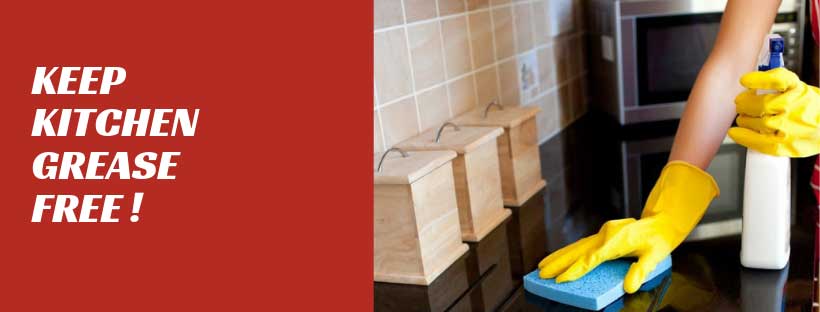
Easy Way to Prevent Grease in Your Kitchen
Keeping your kitchen and kitchen knives clean, and grease-free is crucial to ensuring that you serve your family safe food. In a dirty kitchen, food could quickly become contaminated, leading to intoxications and digestive issues.
Cleaning the kitchen is crucial not only to ensure that it looks good but also to ensure your family’s health and safety.
Maintaining your kitchen clean may seem like an easy task. “Wipe away dust and clean spills, and you are good to go,” you may be thinking. Besides kitchen care, it is essential to keep clean and sharp kitchen knives, sharpening stone or electric knife sharpener. Regular maintenance is the best way to prevent grease.
What causes grease formation in the kitchen?
Usage of oil in dishes is the primary catalyst for grease formation. And the more oil you tend to use in your foods, the worse the grease situation may be.
The thing is that oil vapors produced while preparing food can make their way everywhere in the kitchen. Your countertops, cupboards, and flooring can get covered in oil.
No matter how thin or insignificant this oil layer may seem, it will turn into grease at some point if left untreated. In the end, dust and dirt in the air stick to the oil layer, forming grease.
Where does Grease Settle in the kitchen?
As we already mentioned, the grease could settle in any nook and cranny, in any corner of your kitchen. Regular cleaning procedures in your kitchen thus become a must.
The areas particularly vulnerable to grease buildup are the stove areas – especially behind it, on the top stove exhaust, and the exhaust fans in the wall.
The former two are where the cooking takes place, which is why they are so vulnerable. As for exhaust fans, they suck in the air and the oil vapors in it, which will lead to grease formation sooner or later.
Nooks and crannies are very susceptible to grease buildup as well. That’s because they are more challenging to reach and clean. And without adequate cleaning, stubborn grease forms in them very quickly.
The surfaces least susceptible to grease are flat surfaces. It is easy to clean them and spot dirt on them, so they are unlikely to develop stubborn grease layers.
Overall, the areas that are away from your eyes receive the least treatment, which leads to some stubborn grease buildup. Those are the areas that you should pay special attention to.
Way to Prevent Grease
Use proper cleaning solutions
No matter what cleaning solution you opt for, it should be capable of removing grease efficiently. But you don’t need to go for chemicals to keep your kitchen shining.
The most common and safe cleaning solution is vinegar. It is widely available across households, which is the main reason for its popularity.
Vinegar can pretty quickly treat both light and stubborn stains. A 50% vinegar and water solution is excellent for lighter messes, while undiluted vinegar can deal even with quite stubborn spots.
In the latter case, it is often advised to apply vinegar to the stain and let it sit for 10-15 minutes. Then, a simple, clean, and non-abrasive cloth could do the trick with stubborn stains.
Can also use Lime and club soda for stain removal. Their mixture is mostly used on kitchen cabinets.
Could also use baking soda for cleaning surfaces like exhaust hoods.
No matter what solution you use, always remember to wipe its residue away after each cleaning. And besides, keep in mind that some surfaces like wood may suffer from specific cleaning solutions. Doing a test on a smaller spot is a good idea before the actual cleaning.
Remove spills immediately
One of the excellent rules of keeping your kitchen grease-free is immediately getting rid of spills. Even a seemingly harmless water spill may cause grease buildup. But aside from water, you should pay special attention to sugary and oily substances.
You know how a surface becomes sticky after you spill some juice or sweet tea on it, right? Well, dust and dirt stick to the spills. And, as we already mentioned, this is how grease forms in the kitchen.
No matter what liquid you spill, get rid of it immediately. You’ll be able to prevent their adverse long-term effects. And besides, cleaning fresh spills is much more comfortable.
Pay attention to away-from-view areas
We mentioned that areas that are away from view are especially susceptible to grease buildup. Due to this, you should pay extra attention to their cleaning.
Oil vapors may get onto cupboard handles, decorative elements, your ceiling lamp or fan, behind/below furniture and appliances, and in many other places.
If you have tile flooring, its grout is another point of interest. And due to its porous nature, it may host a pretty nasty grease buildup. Mop the floor regularly and occasionally do some deep cleaning.
Do a light clean up after cooking
Another thing you should do is a light clean up after each cooking session. If you wipe oils and whatnot off of the kitchen surfaces, you will prevent grease buildup.
Pay special attention to your stove and all the surfaces that are near the food. Grease may build upon them if you keep them dirty. And besides, it would tempt all kinds of insects to crawl onto dirty kitchen surfaces.
Use easier to clean furniture and appliances
To make your task more comfortable, you should think about using furniture and appliances that are easier to clean. The logic here is that your items should have a few nooks and crannies as possible. Remember, flat surfaces are much easier to clean.
There are various ways to do this. First of all, you may opt for cupboards and cabinets with groove-less surfaces. Another good idea is to install laminate flooring if that is an option. Laminate is much easier to clean than tile flooring.
Your stove is another point of interest. Gas stoves are notoriously tricky to clean. Flat-top electric and induction stoves are much more convenient in this regard.


